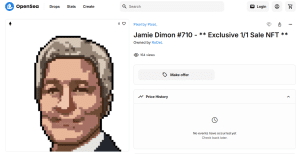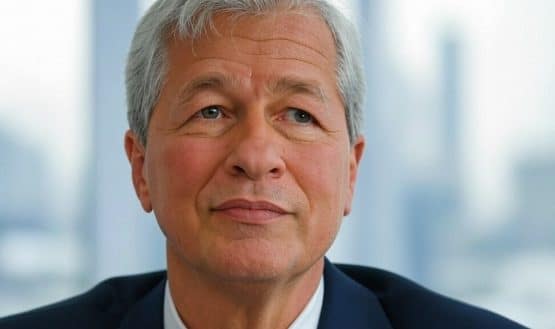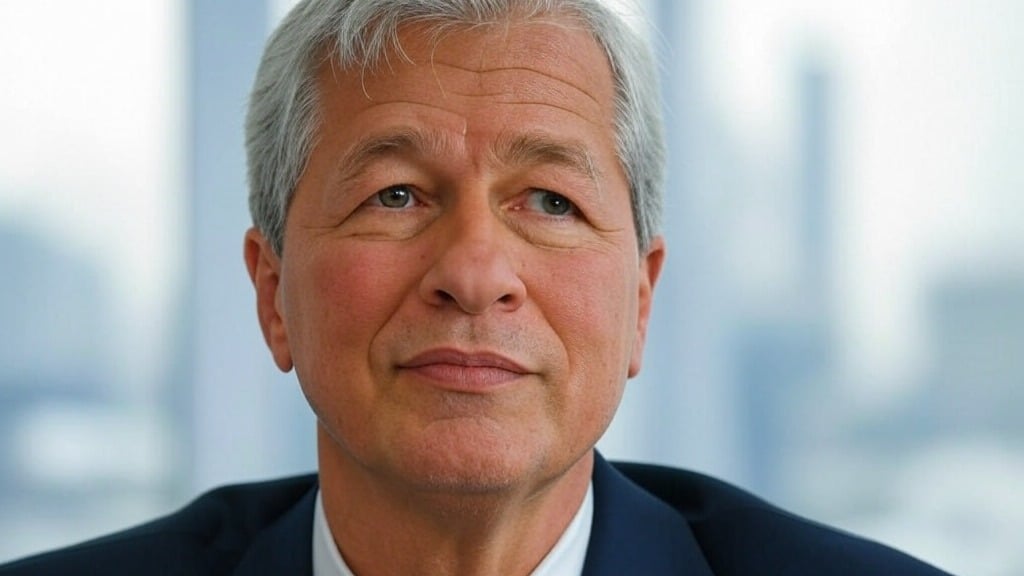On this Page:
Jamie Dimon, the influential CEO of JPMorgan Chase, has amassed considerable wealth over the course of his career in banking. Before rising to the helm of the biggest bank in America, he held positions at some of the most prestigious institutions in finance, including American Express, Goldman Sachs, and Citigroup. He has also become a leading voice on the U.S. economy and earned a reputation as a straight-talking, hands-on leader, with The New York Times describing him as America’s “least-hated banker.”

Breaking Down Jamie Dimon’s Net Worth in 2025
In 2015, Jamie Dimon achieved billionaire status. At the time of writing, the banker has an estimated net worth of $2.6 billion. In 2024, after JPMorgan Chase enjoyed record profits, he earned a pay package of $39 million, including a base salary of $1.5 million and $37.5 million in incentives.
| Year | Net Worth |
|---|---|
| 2025 | $2.7 billion |
| 2024 | $2.1 billion |
| 2023 | $1.6 billion |
| 2022 | $1.6 billion |
| 2021 | $1.8 billion |
| 2020 | $1.2 billion |
| 2019 | $1.3 billion |
| 2018 | $1.3 billion |
| 2017 | $1.1 billion |
Early Life and Education
James (Jamie) Dimon was born on March 13, 1956, in New York City. According to his biography, he learned “a great deal about the brokerage industry ‘across the kitchen table’”. He was deeply influenced by his grandfather, a Greek immigrant who rose from waiter to stockbroker. Jamie’s father, Ted Sr., was a Wall Street veteran and even worked under Jamie at JPMorgan towards the end of his life.
Dimon attended The Browning School, an exclusive college preparatory school on the Upper East Side. When he was a teenager, his father introduced him to Sandy Weill, a family friend and high-powered banker. This connection and Dimon’s ability to network in general would prove to be essential in furthering his career.
After high school, Dimon proceeded to Tufts University where he studied psychology and economics. While there, he wrote an economics paper about the 1974 merger of Shearson (where his father worked) and Hayden Stone (where Weill was Chairman). The essay impressed Weill, who became a long-time mentor to Dimon and opened the door to a summer job at Shearson.
Jamie Dimon on why he chose to work for Sandy Weill over Goldman Sachs or other firms https://t.co/U9monT7vGg pic.twitter.com/pMQbRu10zK
— Bloomberg (@business) March 30, 2017
Early Career
In 1978, Dimon became a management consultant at Boston Consultant Group. Two years later, he started his MBA at Harvard Business School. While at Harvard, he spent a summer working at Goldman Sachs. After graduating as a Baker Scholar, Dimon turned down offers from Goldman, Morgan Stanley, and others and (with Weill’s encouragement) took a job at American Express.
A few years later, Dimon followed Weill to a conglomerate called Travelers Group (formerly Commercial Credit) where he became CFO. in 1998, the conglomerate merged with Citigroup and Dimon became president of the new organization.
In 1999, after fifteen years of mentorship, Weill asked Dimon to resign, saying in an interview later, “The problem was in 1999 he [Dimon] wanted to be CEO, and I didn’t want to retire.” Dimon took the opportunity to spend a year traveling with his children. He considered starting a merchant bank and was in discussions about jobs at Amazon and Home Depot at the time. Finally, he took on the role of CEO at Bank One. This decision put him in a fantastic position to grow his net worth and advance his career.
Dimon, JPMorgan, and the 2008 Financial Crisis
In 2005, JPMorgan Chase acquired Bank One. A year later, Dimon became the Chair CEO of the bank. He quickly took on a much more hands-on role than his predecessors. For example, he reportedly eschewed summaries in favor of hundreds of pages of raw data. Over the coming decades, he would expand the business, shaping it into one of the most powerful financial institutions in the world.
In 2008, the financial crisis hit. Over two years, JPMorgan Chase was devastated, losing more than $50 billion to bad mortgages alone. However, thanks in part to Dimon’s prudent decision-making prior to the crisis, the bank was able to remain profitable and continued to offer credit to customers.
Dimon and JPMorgan took advantage of the crisis to acquire Bear Stearns (for one-tenth the firm’s market price) in a decisive and swift move. The bank also acquired Washington Mutual, which suffered the largest bank failure in U.S. history, and its ~$400 billion in assets and deposits for just $1.9 billion. These acquisitions expanded JPMorgan’s footprint and bolstered its financial stability when many of its peers struggled.
Notably, the bank repaid the $25 billion in government funds it had received as part of stabilization efforts under the TARP policy. This move signaled the bank’s liquidity and self-reliance and reassured investors and the public alike, with many viewing it as a testament to Dimon’s strong leadership.
Nonetheless, the financial crisis still had a significant impact on Dimon’s net worth. His compensation fell from $34 million in 2007 to $19.7 million in 2008. In 2009, he earned a salary of $1 million and extra compensation of around $300k, as well as $16 million in stocks and bonds, which he received based on performance.
| Year | Salary |
|---|---|
| 2024 | $39 million |
| 2023 | $35 million |
| 2022 | $34.5 million |
| 2021 | $34.5 million |
| 2020 | $31.5 million |
| 2019 | $31.5 million |
Is Jamie Dimon Pro Crypto?
It is likely that Jamie Dimon does not own any cryptocurrency or NFTs. The iconic banker has been an outspoken critic of crypto, especially Bitcoin. His comments on Bitcoin include the following:
- A “hyped-up fraud”
- “My personal advice would be don’t get involved.”
- “It’s not the same as gold or fiat currencies. Those are supported by law, police, courts. They’re not replicable, and there are strictures on them.”
- “If I was the government, I’d shut it down”
- “You know, Bitcoin itself has no intrinsic value. It’s used heavily by sex traffickers, money launderers, ransomware.”
Dimon is, however, a fan of blockchain technology and JPMorgan has invested heavily in it for a variety of uses, including smart contracts and faster cross-border payments. Amusingly, Jamie Dimon is also the subject of an NFT listed on OpenSea.

Jamie Dimon Net Worth: Which Stocks Does He Own?
Jamie Dimon is believed to be JPMorgan’s largest individual shareholder, although he owns less than 0.3% of the business. In 2023, Dimon was believed to hold 8.6 million shares of JPMorgan stock. However, in 2024, he off-loaded more than 800k shares. It was the first time he had sold JPMorgan stock since becoming CEO. In February 2025, the banker off-loaded another 866k shares, valued at $233 million.
A Leading Voice in Banking
During his tenure at JPMorgan Chase, Jamie Dimon has become an iconic figure in modern banking. He has challenged regulations and championed innovation, risk-averse banking, and pragmatic leadership. He said in an interview, “If you want the right public policy, you have to be an advocate. And you can’t be parochial. You can’t talk only about that one little regulation that’s going to help your company. You need to talk about tax policy, trade, immigration, technology.”
Naturally, given that Dimon has colossal conflicts of interest when it comes to banking policy, we should take his views with a grain of salt. Here are some of the topics on which he has been most vocal.
Dimon on Dodd-Frank
In the wake of the 2008 crisis, there was a lot of concern about banks being “too big to fail” meaning that the government would be obliged to bail them out at the taxpayer’s expense. As a result, the U.S. federal government implemented a law known as Dodd-Frank which aimed to make the system safer without building a new system from scratch.
Is JPMorgan too big to fail?
— Bloomberg TV (@BloombergTV) May 11, 2023
"I don't know what that word means anymore," CEO Jamie Dimon tells @flacqua, adding that people should not fear consolidation in the financial sector https://t.co/bNlxqzSkJh pic.twitter.com/nhNiPmzO2k
Jamie Dimon has been one of the most outspoken critics of some aspects of Dodd-Frank, including a section called the Volcker Rule, which aims to stop commercial banks from doing proprietary trading, a risky kind of trading that does not benefit bank customers.
Dimon’s comments on the Volcker Rule drew renewed attention in 2012 when JPMorgan suffered a $2 billion loss – which was later deemed to cost them $6.2 billion in the long run. The loss was the result of complex transactions made by a trader nicknamed the London Whale. The debacle was seen as a red flag that more regulation was needed. At the time, Dimon called the incident a “tempest in a teacup,” which led to criticism that he was downplaying the event.
Dimon appeared before a Senate committee to defend the bank’s actions. He agreed that banks should not be “too big to fail” but argued that JPMorgan’s size was good for the country because it allowed them to survive the credit crisis (with the government’s help, of course), buy failing banks, and lend to businesses. He also called the Volcker Rule “vague” and “unnecessary”.
In the wake of the London Whale debacle, Dimon’s pay was halved, and his bonus was reduced by 50% to $11.5 million.
Dimon on Basel III
Jamie Dimon has also been an outspoken critic of Basel III, a set of rules agreed to by regulators from around the world in 2010. Basel III requires the world’s biggest banks to hold 9.5% capital. Dimon reportedly launched a tirade about the rules during a closed-door meeting, calling the rules “blatantly anti-American”.
Over a decade later, Dimon is tackling Basel III Endgame, an update to the rules that U.S. regulators will start enforcing in July 2025. In 2023, Dimon said of the rules, “It’s time to fight back”. Dimon argues that the rules would not have prevented the collapse of Silicon Valley Bank and will harm ordinary Americans.
Dimon on Silicon Valley
Jamie Dimon has been weary of Silicon Valley and the tech world in general for over a decade now. In a 2021 annual shareholder letter, Jamie Dimon warned that fintechs, like Stripe, and Big Tech companies, like Apple and Google, represent major competition for banks. He noted that fintechs are better able to develop fast, easy-to-use products because they are not beholden to legacy technology and bank regulation. Over the next two years, JPMorgan acquired 43 fintech companies in response to the fintech threat.
Dimon on Remote Work
In February 2024, audio was leaked of Dimon delivering an expletive-filled rant about remote work during an internal town hall meeting. In the rant, he says remote work “slows down efficiency, creativity, creates rudeness…slows down decision-making” and that “the young generation is being damaged by this.”
@barrons EXCLUSIVE: JPMorgan CEO Jamie Dimon offered up candid, lengthy thoughts about remote work, bureaucracy, and inefficiency during an internal town-hall meeting in Ohio on Wednesday, according to audio recordings of his remarks obtained by Barron’s. #jamiedimon #jpmorgan
♬ original sound – Barron’s
Jamie Dimon’s Involvement in Politics
Jamie Dimon is a registered Democrat. He has previously said in interviews that he is “a Democrat” but “barely” and commented that “My heart is Democratic but my brain is kind of Republican.”
He has a record of praising and criticizing politicians on both sides of the aisle. For example, he was critical of the Biden-Harris White House for what he saw as an excess of “red tape.” In Trump’s first term, he was critical of the president’s attitude to tariffs. However, in the first few days of Trump’s second term, he praised the president’s use of tariffs, calling them “an economic weapon.” Dimon was also one of the influential personalities who condemned the 2021 United States Capitol attack. He is now reported to be an ”informal advisor” for President Trump.
Jamie Dimon on Trump’s tariffs:
— Geiger Capital (@Geiger_Capital) February 2, 2025
“They’re an economic weapon… I would put in perspective, if it’s a little inflationary but it’s good for national security, so be it.” pic.twitter.com/HavvAv7tMq
There have been rumors on multiple occasions that Dimon would take on a public office at some point. He even considered running for president as a Democrat in 2024 but decided against it because of the potential toll it would take on his family (and likely a very slim chance of winning). There was speculation that he would become Treasury Secretary for the Obama administration and again for the Biden and Trump administrations, but the CEO has instead remained at JPMorgan.
Jamie Dimon’s Net Worth: The Verdict
Jamie Dimon has been a billionaire since 2015. He has an estimated net worth of $2.6 billion in 2025, though we can’t be sure of the exact figure. His compensation as CEO of JPMorgan makes up the bulk of his wealth. It looks like he will continue in the role for the foreseeable future, which means a few more pay packages in the region of $40 million each.
A significant portion of Dimon’s wealth is tied up in JPMorgan stocks, and he is still the largest individual shareholder in the business, despite his recent sales. As of 2025, shares of JPMorgan Chase are up 55% year-on-year, massively increasing his wealth.
Speculation about retirement and possible roles in public office has swirled around Dimon for years, yet he remains central to the identity of America’s largest bank. Whatever the future holds for this formidable figure, he will have an enduring influence on US banking and beyond.
FAQs
Is Jamie Dimon a Democrat?
Jamie Dimon is a registered Democrat, but he has been known to praise and criticize politicians and policies on both sides of the aisle.
Is Jamie Dimon retired?
Jamie Dimon has not retired and has not named a successor. He says he is likely to remain in his role as CEO of JPMorgan Chase for a few more years.
Did Jamie Dimon have a heart attack?
No. In 2020, Dimon had an acute aortic dissection - a tear in the body’s largest blood vessel. He underwent successful emergency surgery to repair the tear.

